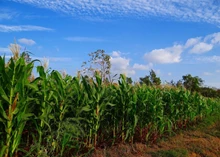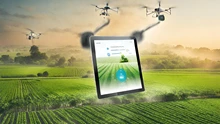
Global agricultural production is increasing as a result of the widespread use of smart technologies, but international researchers warn that this digital-age phenomenon may also yield a crop of another kind: cybersecurity attacks.
In a new article published in the open-access journal Sensors, researchers from King Abdulaziz University in Saudi Arabia, Aix-Marseille University in France, and Flinders University in South Australia have highlighted the dangers.
According to lead author Professor Abel Alahmadi of King Abdulaziz University, "smart sensors and systems are used to monitor crops, plants, the environment, water, soil moisture, and diseases."
"The shift to digital agriculture would improve the quality and quantity of food available to the world's growing population, which is expected to reach 10.9 billion by 2100."
Researchers warn that advances in production, genetic modification for drought-resistant crops, and other technologies are vulnerable to cyber-attacks, particularly if the ag-tech sector does not take the same precautions as other corporate or defence sectors.
The rise of internet connectivity and smart low-power devices, according to Flinders University researcher Dr Saeed Rehman, has facilitated the shift of many labor-intensive food production jobs into the digital domain, including modern techniques for accurate irrigation, soil and crop monitoring using drone surveillance.
"We should not, however, overlook security threats and vulnerabilities to digital agriculture, particularly possible side-channel attacks specific to ag-tech applications," says Dr. Rehman, a cybersecurity and networking expert.
"As evidenced by cyber-attacks on a US watering system, a meatpacking firm, wool broker software, and an Australian beverage company, digital agriculture is not immune to cyber-attack."
"A side-channel attack is when cryptographic or sensitive information is extracted from the operation of physical hardware," says Flinders co-author Professor David Glynn.
"Physical access to devices could be used to easily carry out these attacks, which the cybersecurity community has not explicitly investigated."
The researchers advise investing in precautions and raising awareness about digital agriculture's vulnerabilities to cyber-attacks, with an eye toward the potentially serious consequences for the general public in terms of food supply, labour, and other costs.











